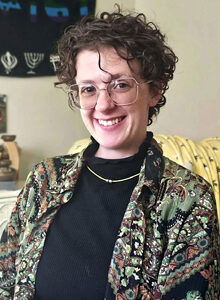It has long been thought that autistic adults desire sex at a lower rate than the general population, and recent research has shown this to be an incorrect assumption seeded with infantilization (Weir et al., 2021). Although autistic adults often need accommodations to be made regarding sensory differences or a need for structure, there is still space for them to have fulfilling sex lives. There is also a lack of adequate sex education provided to autistic adults that considers the increased rates of sexual victimization that can occur throughout their lifespan (Weir et al., 2021). This article aims to discuss ways in which autistic adults can advocate for their sexual needs as well as empower them to be authentic and take up the space they deserve.

Infantilization is the act of treating or responding to an adult in a way that would be appropriate for a child (Stevenson et al., 2011). This is a phenomenon ever present in the autistic community. Studies have shown that when non-autistic (henceforth, allistic) people are asked what comes to mind when they think of an autistic person, they often describe a child (Stevenson et al., 2011). This is also true for many organizations that are aimed at “helping” autistic people. Often, the verbiage found on these websites is centered around autistic children and neglects to acknowledge that autistic children eventually grow into autistic adults (Stevenson et al., 2011). This is crucial to consider when discussing how autistic people choose to approach sex. Infantilization has gotten in the way of proper sex education being provided to autistic individuals and contributed to the significant inconsideration that many autistic people are a part of the 2SLGBTQIA+ community (Weir et al., 2021).
Neuronormative expectations placed on autistic people regarding gender, sexuality, and sex have impeded an open conversation about how autistic adults can navigate sex (Wise, 2023). This can show up in autistic people entering cisheteronormative monogamous relationships because this is what is deemed as “societally acceptable,” not considering that these relationship structures were not designed with autism in mind (Wise, 2023). Autistic people may question societal norms at a higher rate than allistic people, which is hypothesized to be one reason many autistic people are queer, gender-expansive, and/or polyamorous (Weir et al., 2021). These are all pieces of proper sex education for autistic people that are lacking in the healthcare space (Weir et al., 2021).
Accommodations for Sex
Each autistic person will have unique needs, support needs, and traits present, so when considering how to accommodate oneself within the context of sex, it is important to start with what one’s needs are. The autism spectrum can be viewed as a circle, where each individual can define where they fall in various categories such as language, sensory, executive function, perception, and motor skills (Bradshaw et al., 2021). Spending time considering areas where an autistic individual may have higher or lesser needs can lead them to narrowing down accommodations they may need during sex.
Autism comes with a variety of sensory differences and needs that will vary from person to person, so how can one take these into consideration during sex? Touch that feels overstimulating outside of a sexual context may feel pleasurable within a sexual context, so experimenting with this alone or with a trusted partner can lead to discovering boundaries around touch during sex. This is true for the other senses as well. Actions or stimuli that are overstimulating outside of sex may not be overstimulating during sex and vice versa. When it comes to experimenting with sensory needs during sex with a partner, it is important to have a partner with whom you feel safe disclosing these needs and trust that they will honor those needs (Weir et al., 2021). Sensory differences are one reason many autistic people are also a part of the kink community. Some autistic people report their draw to kink is that there are explicit conversations about consent and boundaries that are honored in a safe container (Weir et al., 2021). Kinky or not, autistic individuals deserve to have their needs met and boundaries honored in a sexual container.
Other relevant accommodations could be related to difficulty with transitions and a need for structure. The transitions that naturally arise during sex can feel confusing, overwhelming, or activating (Weir et al., 2021). One example of accommodating this may be having more verbal communication during sexual acts and your partner(s) stating what they are transitioning to or asking if you are ready to transition. This may sound clinical when reading it, but there are ways this can be integrated in a fun, sexy way that can meet an autistic person’s need around transitions.
The need for structure around sex can often feel too rigid for partners of autistic individuals, so again, it is important to have an open dialogue with one’s partner(s) about how everyone’s needs can be met. Structure in sex could be scheduling sex, but it does not have to be. For example, there can be a structure around acts that are done and in what order, a discussion prior to sex about what everyone would like to do, or really any other way that the autistic person can meet this need and meet the needs of their partner(s).
When accommodating an autistic person during sex, it is important to have open, explicit conversations about what is happening for them somatically and for them to reflect on what their needs may be. All sexually active adults, whether autistic or not, deserve to have their needs considered and met and accommodations to be made for them so sex can be as fulfilling and enjoyable as they would like. Again, due to the infantilization that can occur towards autistic adults, there may be shame in stating something is overstimulating or that they do not enjoy an act that is stereotypically “enjoyable.”
There is an increased sexual victimization that can occur for autistic people across their lifespan, and one way to combat this is to push against the stigma that autistic adults are not sexually active or do not enjoy sex (Weir et al., 2021). To empower autistic adults to name their sexual needs and to seek out consensual, fulfilling sexual relations with themselves or others will help push for change to be made on a larger scale. Sex is not a one-size-fits-all topic, and it is important to highlight the specific struggles that autistic people may experience during sex that fall outside of the neuronormative and cisheteronormative society we live under. Discussing how autistic adults may navigate sex challenges these oppressive systems and empowers autistic adults to live their lives authentically and openly and to feel they deserve to be accommodated and have their needs met.
Britt Boylan (They/Them) is a MA candidate in Mindfulness-Based Transpersonal Counseling at Naropa University.
References
Bradshaw, P., Pickett, C., Van Driel, M. L., Brooker, K., & Urbanowicz, A. (2021). ‘Autistic’ or ‘with autism’?: Why the way general practitioners view and talk about autism matters. The Royal Australian College of General Practitioners, 50(3), 104-108. DOI: 10.31128/AJGP-11-20-5721
Stevenson, J. L., Harp, B., & Gernsbacher, M. A. (2011). Infantilizing autism. Disability Studies Quarterly, 31(3). doi.org/10.18061/dsq.v31i3.1675
Weir, E., Allison, C., & Baron-Cohen, S. (2021). The sexual health, orientation, and activity of autistic adolescents and adults. Autism Research, 14(11), 2342-2354. doi.org/10.1002/aur.2604
Wise, S. J. (2023) We’re all neurodiverse. Jessica Kingsley Publishers.





